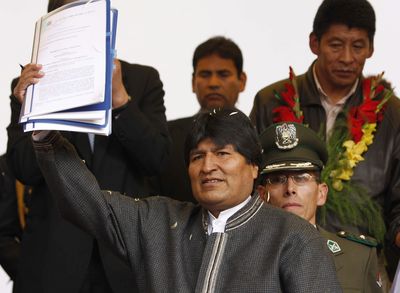World in brief: President can run for re-election

President Evo Morales ended a five-day hunger strike Tuesday after Bolivia’s congress broke a political deadlock, approving a law that lets him run for re-election in December.
Morales looked exhausted and a few pounds thinner as he formally enacted the law.
Morales, 49, had spent the weekend reclining on a mattress in the presidential palace, drinking chamomile tea and chewing coca leaves, a mild stimulant that helps suppress the appetite.
The legislative compromise, reached at 4 a.m. Tuesday, also reserves seven seats for minority indigenous groups in the 130-seat lower of house of the new congress, and enables Bolivians living abroad to vote, potentially adding about 300,000 new voters to the roughly 4 million eligible domestically.
Tehran, Iran
Journalist’s fate in hands of judge
The trial of an Iranian American journalist facing espionage charges is over and her fate rests in the hands of a judge who will deliver a verdict in the next three weeks, a judiciary official in Tehran told reporters Tuesday.
The spokesman for Iran’s judiciary said 31-year-old Roxana Saberi, an American-born dual U.S. and Iranian national, had her day in court on Monday.
Saberi faces accusations of collecting information from Iranian officials and passing it to U.S. intelligence services.
Dubai, United Arab Emirates
Scientist reports cloning of camel
A scientist says the world’s first cloned camel has been produced in the desert emirate of Dubai.
Nisar Ahmad Wani, a senior reproductive biologist at the government’s Camel Reproduction Center, says the cloned camel is a six-day-old, one-humped female called Achievement, or Injaz in Arabic.
Injaz was born April 8.
From wire reports